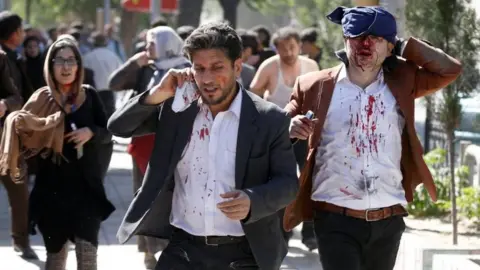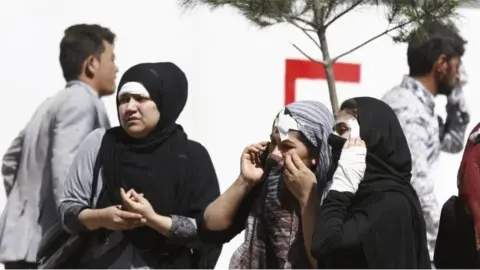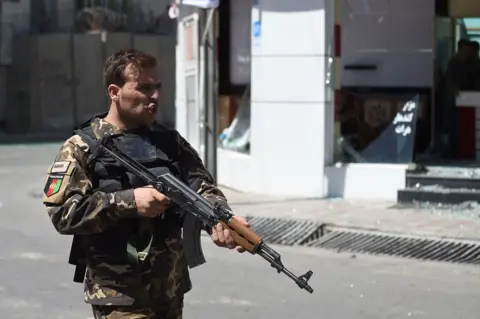Kabul bomb: The hell of losing loved ones in Afghanistan
BBC driver Mohammed Nazir was among scores of victims of Wednesday's bombing in Kabul's secure central zone. As Afghanistan mourns those killed, the editor of the BBC's Afghan service Waheed Massoud, remembers a friend and colleague caught up in an all too familiar scenario.
I woke to a phone call telling me that "a BBC minibus" had been caught up in the Kabul truck bomb attack.
But we did not know for sure how bad it was, and how many of our colleagues were hurt.
As things stand at least 90 were killed, but this toll will undoubtedly rise with hundreds injured.
The immediate feeling was so familiar: a racing heart beat and a thousand simultaneous thoughts going through my head.
My heart felt heavier. I felt it was sinking down to my feet.
I desperately made phone calls any way I could - through Viber, WhatsApp, Facebook, and my mobile - but to no avail.
The whole network was down, another indication that something horrendous had happened.
I was torn between hope and fear. Fearing the loss of another dear one and hoping that all would be fine.
It is devastating when fear wins over hope; I soon found out that one dear colleague, Mohammed Nazir, our driver, had been killed and four other colleagues wounded.
The truck bomb exploded close to Kabul's "Green Zone", the most secure place in the heart of the city protected by guards, blast walls and security boom gates. It killed and wounded dozens of people.
 Reuters
ReutersI can imagine what Nazir's family, his wife and children, were going through as they were waiting for news from BBC colleagues who were searching hospitals and morgues to find him.
As they prayed for good news, they too were battling fears and hopes.
And they are not the only ones. The friends and family of the hundreds of victims of today's attack, like those of Mohammed Nazir, will have had the same experience.
Mohammed Nazir was young. He was the father of three children and the only breadwinner in his family. He had a gentle smile and a warm personality.
I knew Nazir for years and I worked with him most days of the week.
BBC journalists, support staff and visitors remember him as an honest and reliable person. Most colleagues deploying from Kabul to dangerous provinces would prefer to go with Nazir.
The irony is he survived decades of war, conflict and hostile environments but was killed by a bomb in the most secure diplomatic enclave in the heart of Kabul.
Many BBC colleagues find it hard to believe that the smiling face that drove them to work this morning will be buried by the end of the same day.
The thought that he is no longer with us is hanging over everyone. We think of his children, his wife and extended family and how they will survive without him in a country that does not have a welfare system.
 EPA
EPAAt least Nazir's family will receive financial support from the BBC. But what will happen to those of the others killed and wounded?
The attack today not only took lives, and caused injury. It also in an instant changed the future for hundreds of families.
Soon, the carnage of today will linger only as another casualty figure from yet another attack. Life will carry on.
But what happened here in Kabul is simply a reflection of what Afghanistan has been experiencing over the past 38 years in various different forms and guises.
 AFP/Getty Images
AFP/Getty ImagesThe early post-2001 years were a brief period of hope when many believed the country would finally be able to breathe a sigh of relief from constant chaos. But it did not last long.
Today, Afghanistan is as much a battleground for proxy wars and regional arm wrestling as it was decades ago, with ordinary Afghans feeling like victims of an unchosen fate.
Although Nato military boots on the ground are present to provide training and support to the Afghan security forces and the government, the situation has not improved. The insurgents enjoy similar covert support today from regional players.
As Wednesday's devastating events proved, security, even in the most protected areas, is fragile.
Vulnerabilities in the security forces, or the sophistication of the insurgent groups, or both, could be to blame .
But for the public the situation represents one continuous, and lifelong, nightmare.
